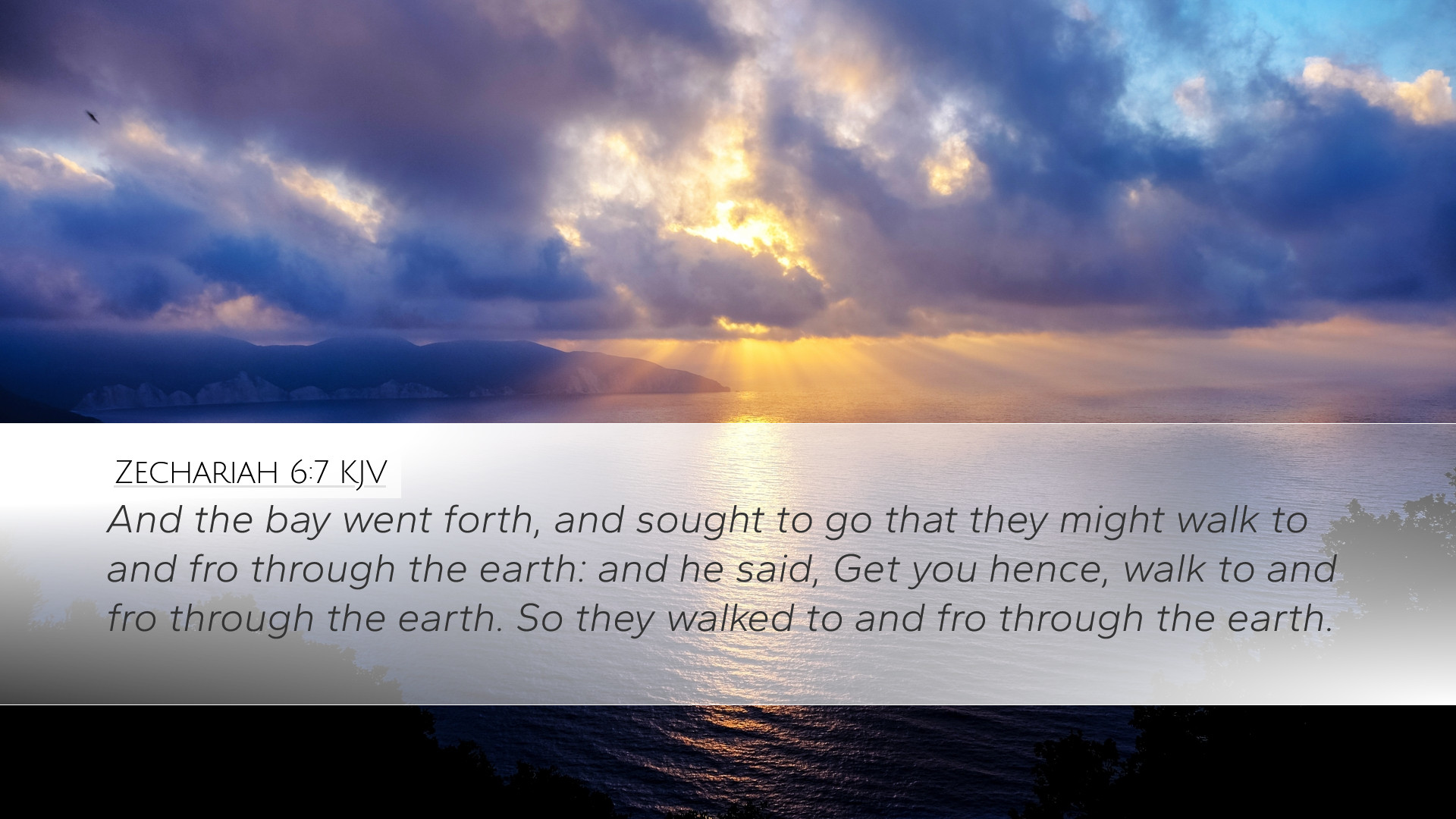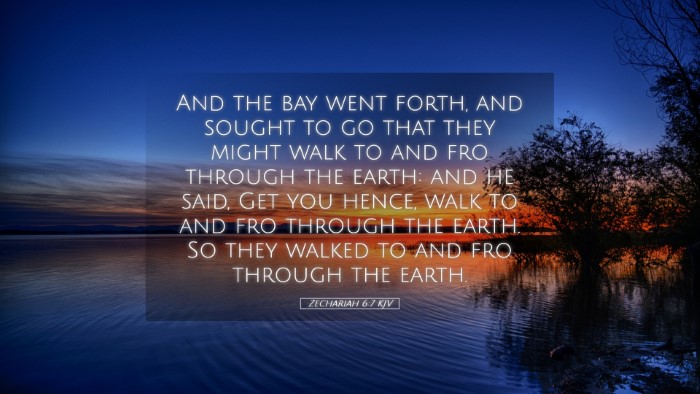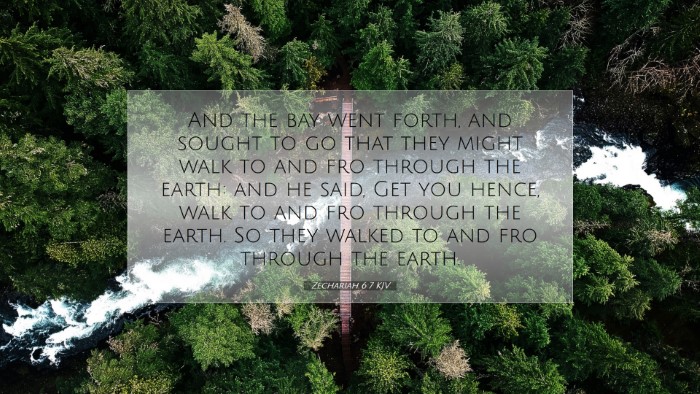Old Testament
Genesis Exodus Leviticus Numbers Deuteronomy Joshua Judges Ruth 1 Samuel 2 Samuel 1 Kings 2 Kings 1 Chronicles 2 Chronicles Ezra Nehemiah Esther Job Psalms Proverbs Ecclesiastes Song of Solomon Isaiah Jeremiah Lamentations Ezekiel Daniel Hosea Joel Amos Obadiah Jonah Micah Nahum Habakkuk Zephaniah Haggai Zechariah MalachiZechariah 6:7
Zechariah 6:7 KJV
And the bay went forth, and sought to go that they might walk to and fro through the earth: and he said, Get you hence, walk to and fro through the earth. So they walked to and fro through the earth.
Zechariah 6:7 Bible Commentary
Commentary on Zechariah 6:7
Bible Verse: Zechariah 6:7 - "And the bay went forth, and sought to go that they might walk to and fro through the earth: and he said, Get you hence, walk to and fro through the earth. So they walked to and fro through the earth."
Introduction
This verse is part of a profound prophetic revelation given to Zechariah concerning the spiritual condition of Israel and its future restoration. The imagery of the chariots and horses signifies the divine judgment and the movement of God's providential care throughout the earth. In this commentary, insights from Matthew Henry, Albert Barnes, and Adam Clarke will be interwoven to bring a deeper understanding of the text.
Context and Background
Zechariah was a prophet during the time when the Jews were returning from Babylonian exile. His prophetic visions serve not only to encourage the Jewish people but also to outline the coming of the Messiah and the ultimate establishment of God's kingdom. In the broader context of Zechariah 6, we find a depiction of God's sovereignty over the nations and His control of history.
Verse Analysis
The Bay Horse
In this verse, the “bay” horse represents one of the four chariots emerging from between two mountains of brass, which symbolize God’s judgment and intervention. Matthew Henry notes that the colors of the horses represent different aspects of God's providence. The bay horse, specifically, is seen as a symbol of vigor and power, suggesting a zealous pursuit of God’s will.
Seeking to Walk to and Fro
The theme of seeking to “walk to and fro” signifies an active and purposeful search through the earth. Albert Barnes expresses that this represents the omnipresence of God’s spirit, which is always at work, inspecting and overseeing the affairs of men. It reminds the reader that God is not a distant deity; rather, He is actively involved in worldly matters.
Divine Command
The command given to the horsemen to “walk to and fro through the earth” emphasizes a divine directive. Adam Clarke explains that this action symbolizes the investigation and surveillance of the earth to assess righteousness and iniquity. It reflects God’s preparedness to act in judgment or mercy based on the moral conditions found.
Theological Implications
God’s Sovereignty
The passage underlines God's absolute sovereignty over all creation. The movement of the bay horse underlines that God is in control of history, actively surveying the earth to ensure that justice prevails. This reflects the assurance for believers that despite the tumultuous conditions of the world, God is present and watchful.
Hope for Restoration
For the Jewish people, this vision offers hope for restoration and divine favor following their return from exile. The impetus behind God’s observation is linked to His covenantal faithfulness. As Matthew Henry notes, God's concern for Jerusalem and His people drives His actions. For the faithful, this serves as a reminder that God does not forsake His people, even amidst trials.
The Nature of Prophetic Revelation
This verse gives insight into the nature of prophetic revelation itself. The chariots and their riders serve as agents of God's will on earth — a powerful image of how divine messages are conveyed. Adam Clarke emphasizes that these visions illustrate the complex interactions between heaven and earth, weaving together God’s will with human events.
Practical Applications
Encouragement in Ministry
For pastors and church leaders, this passage serves as a profound encouragement. Just as the horsemen are sent forth to observe and act, so too are leaders called to be vigilant in their ministry. They should be actively engaged in the community, seeking out opportunities to spread the gospel and promote justice.
Awareness of God’s Presence
Believers are reminded of God's continuous presence and activity in the world. This awareness fosters a sense of vigilance and responsibility in ethical behavior, knowing that God is observing and ultimately will judge actions. Albert Barnes encourages the faithful to conduct themselves in a manner worthy of God's watching eye.
Hope Amidst Trials
The passage reassures believers that they are not alone in their struggles. In times of trouble, understanding that God is actively observing and caring for His creation brings comfort and peace. This truth encourages individuals to trust in God’s providence, embracing their roles within His divine plan.
Conclusion
Zechariah 6:7 encapsulates themes of God’s sovereignty, diligence, and presence. As believers reflect upon this verse, they are drawn into a deeper understanding of their relationship with the divine, marked by hope and responsibility. The insights drawn from Henry, Barnes, and Clarke provide a rich tapestry of theological and practical applications that resonate with the heart of Christian faith.
References
Commentary references include:
- Matthew Henry’s Commentary on the Whole Bible
- Albert Barnes’ Notes on the Old and New Testaments
- Adam Clarke’s Commentary on the Bible


